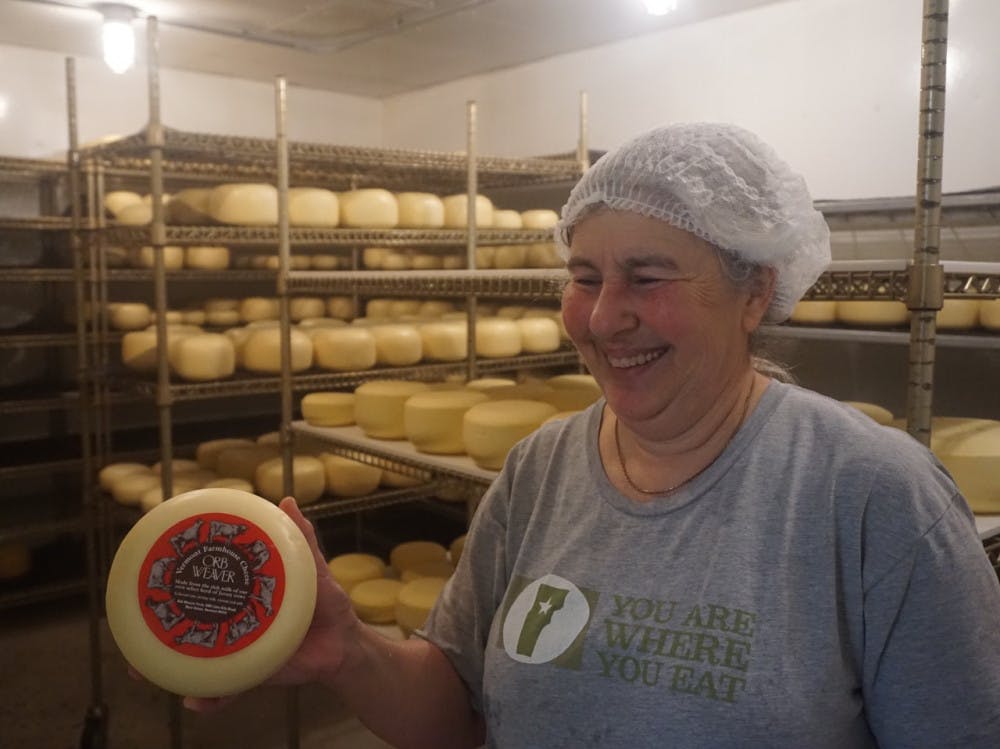For local Vermont farmers Marjorie Susman and Marian Pollack, cheesemaking has been a way of life since 1982. The proud owners and primary operators of Orb Weaver Farm in New Haven, Vt., Susman and Pollack produce two artisan cheeses sold exclusively in Vermont, including at local businesses 51 Main, the Champagne & Sparkling Wine Bar, Otter Creek Bakery and the Middlebury Co-op.
On their sprawling 100-acre farm located just west of Camel’s Hump Mountain, Susman and Pollack dedicate their winters to making artisan cheese from November to May. Following the European tradition, these women stir, form, wax and date-stamp each wheel of cheese they produce by hand, without the mechanical stirrers or hydraulic presses which have become increasingly ubiquitous in the commercial cheese industry.
Using these methods, Orb Weaver produces their Farmhouse and Cave-Aged cheeses. These two unique cheeses — Susman describes the Farmhouse as “a good all around cheese” whereas the Cave-Aged is denser and more complex — share the same recipe but differ in taste because of their individual aging processes.
The Farmhouse Cheese is waxed and aged in a walk-in refrigerator for eight months. In contrast, the Cave-Aged is not wax and is placed in their cheese cave — a stone cave resembling the Hobbit’s house built into a hillside near their barn — for three years of aging.
With little to no cheesemaking experience, Susman and Pollack developed their cheese recipe by experimenting in their kitchen in the early 1980s.
“Because nobody was making cheese at that point, there was no one to ask questions of: there was no cheese council,” said Susman. “We just sort of put our heads down and went for it.”
Since their inauspicious beginnings, Orb Weaver Farm cheese has gained national acclaim, including several recognitions from the American Cheese Society in various categories.
“We have kind of a national reputation, although we never tried to get it,” explained Pollack.
Although there is demand for their cheese in New York City and Boston, Susman and Pollack have decided to only sell to local Vermont businesses.
“It is really important to us to keep the cheese local,” Susman said.
Because they’ve been in the business for so long, Orb Weaver Cheese has become a staple of this region.
“We’ve met grown-ups now who were raised on our cheese,” Susman said. The Penny Cluse Café in Burlington, Vt., even serves an Orb Weaver sandwich.
In addition, Orb Weaver Farm is unique because it is one of the few farms in Vermont that is owned and operated exclusively by women.
The number of female farmers is on the rise nationally and in Vermont. In 2012, the year of the last agricultural census, female farmers controlled seven percent of all farmland and accounted for three percent of sales.
USDA data on farming shows that Vermont has one of the highest percentages of women farmers in the country. Thirty-nine percent of Vermont farmers are women, totaling nearly 5,000 female farmers in the state.
More than 22 percent of Vermont’s female famers are the principal operators of their farm, meaning that they are the person in charge of the farm’s day-to-day operations.
While these figures suggest that women are making significant strides into the previously male-dominated industry of farming, numbers take a sharp turn south when considering ownership.
Thus, while Susman and Pollack are part of this growing trend of female farmers, they are also unusual in two ways. First, their entrance into farming in 1981 placed them at the forefront of this wave of female farmers.
“When we moved here, our neighbors thought we were just two rich kids with a trust fund,” Pollack remembered. “But we proved ourselves hard workers.”
“Now our neighbors say, ‘we don’t know anybody who works like you girls,’” Susman added.
Second, Susman and Pollack distinguish themselves from the vast majority of female farmers because most female farmers are often only farm operators, not owners.
Susman and Pollack believe their gender contributes to some of the success of their farm.
“Men bring a different energy to an operation,” Pollack said. “They are restless.”
Susman suggested that women are more likely to be content with a smaller-scale business, like Orb Weaver’s, than male farmers.
Still, cautioned Pollack, women are not inherently better farmers.
“I think it’s a level-playing field,” Pollack said. “It depends on your skill as a farmer.”
Orb Weaver Farm Celebrates Nearly 35 Years of Artisan Cheese Making in Vermont

Comments


